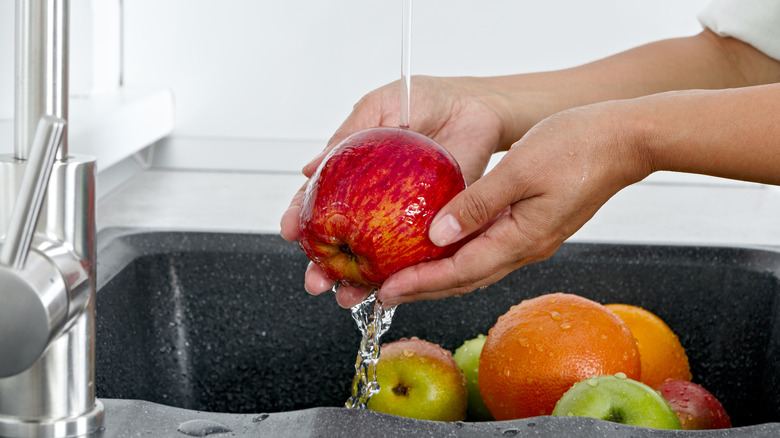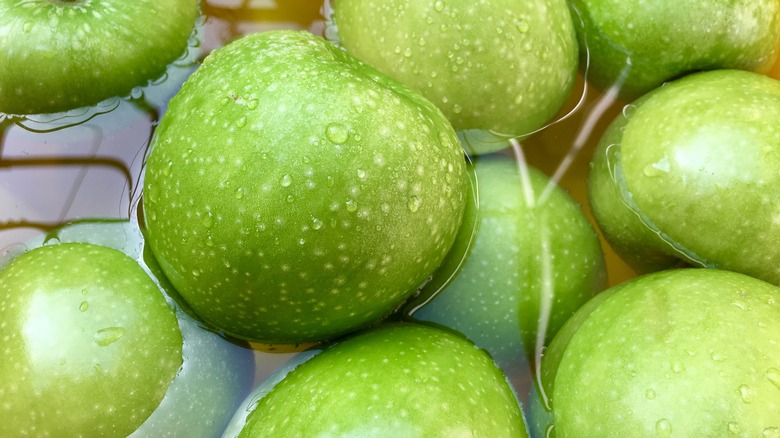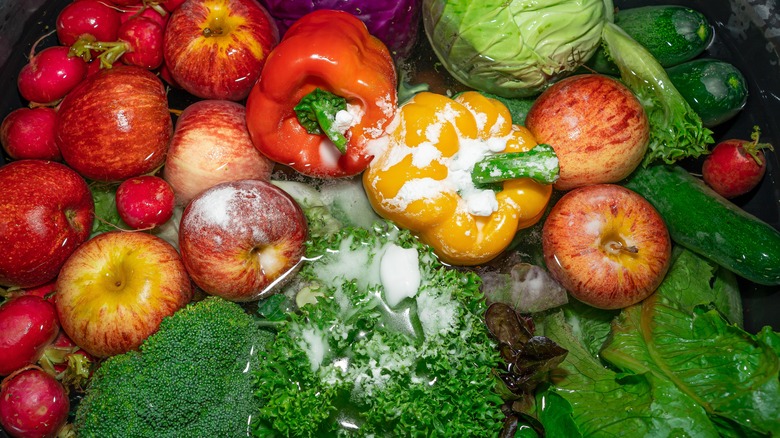You've Probably Been Washing Apples Wrong
The plan is to make the most awe-inspiring apple pie anyone has ever tasted. When you get home with your fresh Granny Smiths, you take them out of the bag and rinse them under the faucet to remove any dirt. This ritual should be all you need to do to have clean apples for your amazing dessert, right? Actually, if you have a habit of doing this, you've probably been missing out on a better way to disinfect your apples.
You've likely washed your apples under water for years, and good on you. After all, the Centers for Disease Control (CDC) recommends that you "[w]ash or scrub fruits and vegetables under running water — even if you do not plan to eat the peel," as this will remove dirt and any potential germs from the skin. But for an ever more effective clean, add some baking soda to the mix.
Baking soda can help remove potentially hazardous chemicals from apples that water alone won't eliminate. Create a solution of 2 cups cold water and 1 teaspoon baking soda in a bowl. Agitate the apples in the solution and let them sit there for 12 to 15 minutes. After their bath, rinse the apples with cold water and pat them dry.
How the baking soda works
Simply rinsing apples under the sink won't completely remove pesticides that could be lingering on your fruit. As examples, the fungicide thiabendazole and insecticide phosmet aren't water-soluble and need the chemical properties and fine grit of bicarbonate to help them rinse away. According to a study published in the Journal of Agricultural and Food Chemistry, a solution of sodium bicarb was able to remove both of these (better even than water and bleach) from the tested apples.
It's a good idea to source your fruit as locally as possible as well because time is also a factor for the cleanest eating; researchers in the study discovered that this pair of chemicals had seeped into the fruit beneath the peel. Chemicals can leech into fruits and vegetables and become what are known as internalized pesticides. Peeling your apples can help eliminate these, but you do miss out on the nutritious skin of the fruit. One way to avoid as many chemicals in/on your apples as possible is to buy them organic.
All produce can benefit from a bath of bicarbonate soda
Apples are far from the only fruit or vegetable this technique works with. Plenty of other varieties of produce can contain harmful pesticides, like tomatoes and leafy greens. Berries, in particular, can be challenging to effectively wash because of how delicate they are, but gently bathing them in a baking soda solution is a way to clean them.
Root vegetables, such as carrots and radishes, can be especially dirty occasionally and benefit from a deeper clean before consumption, which is when you should be washing all your produce. Although you may be tempted to wash your produce right after you buy it before you put it in the fridge, this is something to avoid, as any moisture left on your washed produce can encourage rot.
The pesticide levels in apples and other produce are too low to be particularly hazardous according to experts, though there is some concern over long-term exposure. Even though you've probably been giving your apples a quick rinse before use for years, you shouldn't have too much to worry about. But, if you're trying to eliminate as many chemicals as possible from your apples, or even if you simply don't like the idea of having any amount of pesticides in your food, a baking soda bath may be worth the extra time.


